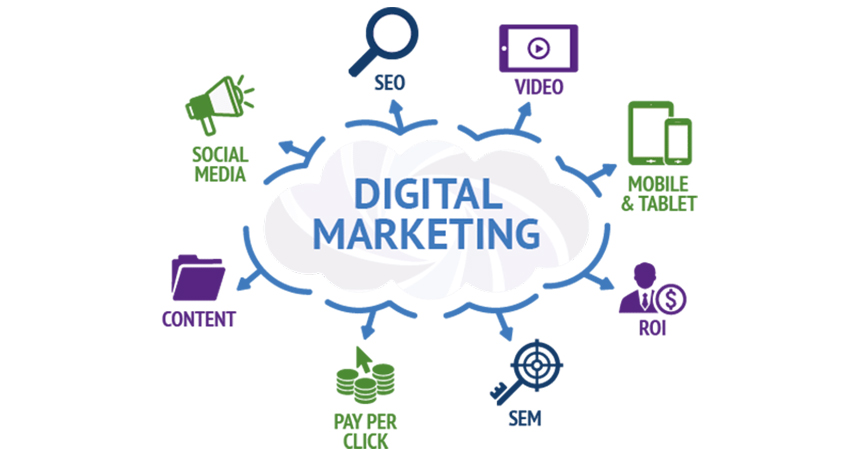The Who, What, Why, & How of Digital Marketing
In today’s fast-paced, digitally driven world, businesses must leverage the power of digital marketing strategies to stay competitive and relevant. With the rise of online platforms and the ever-evolving landscape of social media marketing, SEO, content marketing, and paid advertising, having a well-defined digital strategy has become crucial.
The ability to reach a global audience through targeted digital campaigns, measure performance in real-time, and adapt to emerging trends makes digital marketing an indispensable tool for businesses looking to thrive in the digital era. This Comprehensive Digital Marketing Guide will provide you with the knowledge and tools needed to navigate the complexities of digital marketing successfully and stay ahead in the game.
Whether you’re new to the world of digital marketing or looking to refine your current efforts, this Comprehensive Digital Marketing Guide will walk you through the essential strategies that can elevate your brand’s presence, increase conversions, and ultimately drive growth in the online space.
Who is Involved in Digital Marketing?
Each of these roles in digital marketing plays a crucial part in achieving a comprehensive and successful marketing strategy. Let’s dive deeper into the responsibilities and contributions of each key player:
1. Digital Marketers
These individuals are the architects of the overall digital marketing strategy. They are responsible for setting clear objectives, defining target audiences, and determining the best channels to reach them.
Digital marketers also allocate budgets, monitor campaign performance, and adjust strategies based on data analysis. Their role is to ensure that the digital marketing efforts align with the organization’s goals and generate a positive return on investment (ROI).
2. Content Creators
Content creators are the storytellers of the digital marketing world. They craft compelling narratives through various mediums such as blog posts, articles, videos, infographics, and social media posts. Their primary goal is to engage the audience, convey the brand’s message, and provide value.
Quality content not only attracts visitors but also keeps them engaged and encourages them to take desired actions, such as making a purchase or subscribing to a newsletter.
3. Web Developers and Designers
A website is often the first touchpoint between a business and its audience. Web developers and designers are responsible for creating visually appealing and user-friendly websites.
They ensure that the website is responsive (compatible with various devices), loads quickly, and provides a seamless user experience. A well-designed website can significantly impact user engagement, bounce rates, and conversion rates.
4. SEO Specialists
Search Engine Optimization (SEO) specialists play a critical role in improving a website’s visibility on search engines like Google. They conduct keyword research, optimize on-page and off-page elements, and monitor search engine rankings.
SEO specialists are essential for driving organic (unpaid) traffic to a website, as websites ranking higher in search results are more likely to attract visitors.
5. Social Media Managers
Social media has become a powerhouse in digital marketing. They are responsible for creating and curating content for platforms like Facebook, Twitter, Instagram, and LinkedIn. They engage with followers, respond to comments and messages, and track performance metrics.
Effective social media management can build brand awareness, foster customer loyalty, and drive traffic to the website.
6. Email Marketers
Email marketing remains one of the most effective direct communication channels with customers. It creates targeted email campaigns, segment email lists, and use automation to send personalized messages.
They aim to nurture leads, promote products or services, and maintain ongoing communication with customers, ultimately leading to conversions and repeat business.
7. Data Analysts
Data analysts are the detectives of digital marketing. They collect and analyze data from various sources, including website analytics, social media insights, and email marketing reports. By interpreting this data, they can identify trends, measure campaign performance, and provide actionable insights.
Data-driven decisions are crucial for optimizing marketing strategies and maximizing ROI.
In the ever-evolving landscape of digital marketing, collaboration among these professionals is key to success. A well-coordinated team that leverages the expertise of each player can create a holistic and effective digital marketing strategy that achieves business objectives and adapts to the changing digital landscape.
What is Digital Marketing?
Digital marketing is a multifaceted approach to reaching and engaging with customers in the digital age. It leverages electronic devices and the internet to connect with a target audience, making use of various online tactics and channels.
Here’s a closer look at some key components of digital marketing:
1. Search Engine Marketing (SEM)
SEM involves paid advertising on search engines like Google. It encompasses pay-per-click (PPC) ads, where businesses bid on keywords to have their ads displayed at the top of search engine results pages (SERPs).
SEM is highly effective for driving immediate and targeted traffic to a website.
2. Search Engine Optimization (SEO)
SEO focuses on optimizing a website’s content and structure to improve its organic (unpaid) ranking in search engine results.
By enhancing various elements, including keywords, meta tags, and user experience, businesses aim to increase their visibility and attract organic traffic.
3. Content Marketing
Content marketing revolves around creating and distributing valuable, relevant content to attract and engage a target audience. This content can take various forms, such as blog posts, articles, videos, infographics, and more.
The goal is to establish authority, build trust, and guide potential customers through the buyer’s journey.
4. Social Media Marketing
Social media platforms like Facebook, Instagram, Twitter, and LinkedIn are utilized to promote products or services, enhance brand awareness, and engage with customers. This strategy involves creating and sharing content, running paid advertising campaigns, and fostering a community of followers.
5. Email Marketing
Email marketing remains a robust tool for direct communication with customers. Businesses send targeted emails to subscribers to promote products, share updates, deliver personalized offers, and nurture leads.
Email marketing campaigns can be automated and highly segmented to maximize effectiveness.
6. Affiliate Marketing
In affiliate marketing, businesses collaborate with affiliates or partners who promote their products or services.
Affiliates earn a commission for driving traffic, leads, or sales to the business’s website through their marketing efforts. This performance-based approach is cost-effective and mutually beneficial.
7. Content Advertising
Content advertising involves promoting content through paid channels. This may include native advertising (sponsored content that blends seamlessly with its hosting platform), sponsored content on websites, or influencer partnerships, where influencers promote a brand’s products or services to their audience.
8. Video Marketing
Video marketing leverages the power of video content to convey messages and engage audiences. Platforms like YouTube, Vimeo, and social media are popular for sharing videos.
Video marketing can take various forms, including product demos, tutorials, vlogs, and storytelling videos.
Digital marketing is versatile, adaptable, and data-driven. It empowers businesses to target specific audiences, measure campaign performance, and make data-informed decisions.
In today’s interconnected world, a well-rounded digital marketing strategy is essential for businesses seeking to thrive and succeed in the digital landscape.
Why Digital Marketing?
The decision to embrace digital marketing is driven by numerous compelling reasons. Let’s explore why businesses of all sizes are increasingly turning to digital marketing strategies:
1. Wider Reach
The internet’s global reach is unparalleled. Digital marketing transcends geographical boundaries, enabling businesses to connect with a vast and diverse audience.
Whether your target audience is local, national, or international, digital marketing allows you to extend your reach far beyond traditional marketing methods.
2. Cost-Effective
Digital marketing often offers a more cost-effective solution compared to traditional marketing channels such as print, TV, or radio advertising.
With digital marketing, businesses can allocate budgets efficiently, optimize campaigns in real-time, and achieve a higher return on investment (ROI).
3. Data-Driven
Data is the backbone of digital marketing. Businesses can access a wealth of data and analytics, allowing them to measure the performance of their campaigns with precision.
This data-driven approach empowers businesses to make informed decisions, identify what works and what doesn’t, and continually refine their strategies for better results.
4. Targeted Marketing
Digital marketing provides the capability to precisely target specific audiences. You can tailor your messages based on demographics, interests, behaviors, and more.
This means that your marketing efforts are more likely to reach the most relevant prospects who are genuinely interested in your products or services.
5. Personalization
Personalization is a key driver of customer satisfaction and loyalty. Through data analysis and automation, digital marketing enables businesses to deliver personalized content and offers to individual customers.
This level of personalization enhances the customer experience, making customers feel valued and understood.
6. Real-Time Engagement
Digital marketing allows businesses to engage with their audience in real-time. Whether through social media interactions, live chat on websites, or instant email responses, businesses can establish immediate connections with customers, address concerns promptly, and build stronger relationships.
7. Flexibility and Adaptability
Digital marketing strategies can be adapted quickly to respond to changing market conditions or customer preferences.
Unlike traditional marketing methods that require lengthy production timelines, digital campaigns can be adjusted on the fly to seize opportunities or mitigate challenges.
8. Measurable Results
Digital marketing provides clear and measurable results. You can track key performance indicators (KPIs) such as website traffic, click-through rates, conversion rates, and sales.
This level of transparency allows you to gauge the effectiveness of your campaigns and make data-backed decisions.
9. Competitive Edge
In today’s digital landscape, having a strong online presence and a well-executed digital marketing strategy can provide a significant competitive advantage.
It allows businesses to stand out in crowded markets and capture the attention of their target audience.
10. Continuous Growth
Digital marketing is a field that continually evolves. Staying updated with industry trends and adopting innovative technologies can lead to sustainable growth.
Businesses that embrace digital marketing can adapt to changing consumer behaviors and emerging opportunities in the digital space.
Digital marketing offers a multitude of advantages, making it an essential component of modern business strategy. It empowers businesses to reach wider audiences, optimize their budgets, leverage data for insights, and create personalized experiences.
As businesses continue to navigate the digital landscape, the adoption of digital marketing is not merely a choice but a necessity for sustainable growth and success.
How to Succeed in Digital Marketing?
Succeeding in digital marketing requires a strategic approach that combines creativity, data-driven decision-making, and adaptability to a dynamic landscape.
Here are actionable strategies to help you achieve success in digital marketing:
1. Set Clear Goals
Begin by defining specific and measurable goals for your digital marketing campaigns. These goals should align with your overall business objectives.
Common goals include increasing website traffic, generating leads, boosting sales, or enhancing brand awareness. Setting clear goals provides direction and helps you measure the success of your efforts.
2. Know Your Audience
Deeply understanding your target audience is fundamental to success. Conduct thorough market research to identify their needs, preferences, pain points, and behaviors. Create detailed buyer personas to guide your content creation and targeting efforts.
Knowing your audience enables you to tailor your messaging effectively.
3. Multi-Channel Approach
Embrace a multi-channel approach to reach a broader audience and diversify your marketing efforts. Utilize various digital marketing channels such as search engines, social media, email, content marketing, and paid advertising.
Each channel has its strengths, and a well-balanced strategy can increase your brand’s visibility and engagement.
4. Content Quality
High-quality content is the cornerstone of effective digital marketing. Create content that is not only informative but also engaging and valuable to your audience. Consistently publish content that addresses their pain points, educates them, or entertains them.
Quality content sets you apart from competitors and encourages audience loyalty.
5. SEO Optimization
Search Engine Optimization (SEO) is critical for improving your website’s visibility in search engine results. Conduct keyword research to identify relevant keywords for your industry and incorporate them naturally into your content.
Optimize your website’s structure, metadata, and mobile-friendliness. Regularly update your content to stay relevant in search rankings.
6. Data Analysis
Regularly collect and analyze data to assess the performance of your digital marketing campaigns. Use tools like Google Analytics, social media insights, and email marketing reports to track key metrics such as website traffic, conversion rates, click-through rates, and ROI.
Data analysis helps you identify what’s working and what needs improvement, allowing you to make informed decisions and optimize your strategies.
7. Stay Updated
The digital marketing landscape is ever-evolving. Stay informed about industry trends, algorithm changes, and emerging technologies. Attend webinars, conferences, and workshops, and follow industry blogs and news sources.
Adaptability is crucial in the digital realm, and staying updated ensures your strategies remain relevant and effective.
8. Test and Iterate
Embrace a culture of experimentation. A/B testing allows you to compare different variations of your campaigns to determine what resonates best with your audience.
Test various elements, such as ad copy, landing pages, email subject lines, and call-to-action buttons. Continuously iterate and refine your strategies based on the insights gained from these tests.
9. Engage with Your Audience
Actively engage with your audience through social media, email, and other communication channels. Respond to comments and messages promptly, encourage user-generated content, and foster a sense of community around your brand.
Building strong customer relationships can lead to increased loyalty and advocacy.
10. Invest in Education
Invest in ongoing education and training for yourself and your team. It is a field that requires continuous learning.
Consider certifications in areas like Google Ads, Google Analytics, social media marketing, and content marketing to stay competitive and updated on best practices.
Succeeding in it involves a strategic blend of goal-setting, audience understanding, content quality, data analysis, and adaptability.
By following these strategies and staying committed to continuous improvement, you can navigate the digital landscape effectively and achieve your marketing objectives.
Conclusion: Digital Marketing Strategies
Mastering digital marketing strategies is essential for businesses seeking success in the modern digital landscape. From SEO and content marketing to social media and email campaigns, businesses can use a variety of tools and techniques to effectively reach and engage their target audience.
This Comprehensive Digital Marketing Guide has provided a deeper understanding of the essential elements of successful digital marketing and highlighted the roles of key professionals in these strategies. By implementing these digital marketing strategies and continuously adapting to market changes, businesses can achieve significant growth, enhanced customer engagement, and long-term success.
About CO-OFFIZ : Coworking Space in Delhi-NCR
CO-OFFIZ is a coworking space in Delhi-NCR tailored for young professionals, startups, freelancers, and entrepreneurs. We emphasize a collaborative work culture that enhances productivity while providing a hassle-free and aesthetically pleasing environment based on Vastu principles.
Our modern amenities include high-speed internet, unlimited tea/coffee, breakout zones, power backup, and CCTV security. Our vibrant meeting rooms feature LED TV projectors and ergonomic chairs, fostering an ideal workspace.
With locations in in Preet Vihar (East Delhi), Janakpuri (West Delhi), Netaji Subhash Place (North Delhi), Noida Sec-63 and Gurugram Sec-58, we offer flexible seating, dedicated desks, and private cabins at competitive prices, all conveniently located near metro stations for easy access.



